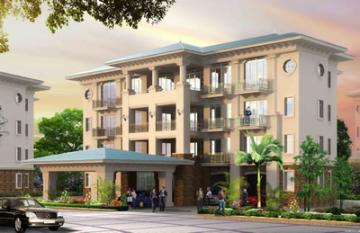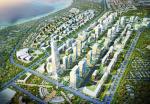New urbanism heralds a return on property demand and development in Africa
 An artist’s impression of an apartment building in a new upmarket golf resort development on Lake Victoria, Uganda.
An artist’s impression of an apartment building in a new upmarket golf resort development on Lake Victoria, Uganda.
The concept of new urbanism in Africa, hailed as a fresh approach to urban living from both a town planning and architectural perspective, has far-reaching implications from a property demand and development point of view.
As growing urbanisation in Africa aids economic growth - as larger concentrations of people in cities create large customer bases, promote more efficient labour markets and reduce transport costs, increasing opportunities arise in regard to residential property development and ownership, reports Pam Golding Property group CE Andrew Golding.
“Many of the largest cities in Africa are growing rapidly – Nairobi, Kinshasa and Dar es Salaam, for example, are expected to see population growth of over 70 percent by 2025. Africa’s mega-cities, including Lagos, Cairo, Luanda and Johannesburg, are increasingly the engines of its economic growth.
“With robust economic growth rates anticipated for the continent during the next decade, as well as healthy growth rates in individual wealth, Africa is expected to show the most rapid growth in new millionaires over the next decade – albeit from a low base. The number of dollar millionaires in Nigeria, Kenya and Angola is expected to more than double by 2030 - in fact, millionaires in Nigeria are forecast to increase by 174 percent to 43 000,” he says.
It is said that the number of Africans with $30 million in assets – the ultra HNWI (high net worth individual) is anticipated to rise by 53 percent to 2 858 by 2023, far outstripping the average pace of growth across the rest of the world, and by which time there are likely to be 38 billionaires on the continent.
“These individuals are currently growing their real estate portfolios quite aggressively, which accounts for the growth in the number of buyers of property in South Africa from other African countries,” says Dr Golding.
“Africa’s city dwellers generally earn more and spend more than their rural counterparts and the urban middle class is growing across much of the continent, which is helping create dynamic consumer markets and attracting overseas investors,” he said.
African retail markets are rapidly developing, while the phenomenal growth of Africa’s technology sector – along with a mobile revolution - is creating demand for office space along with multinational companies from the banking sector and companies related to the oil and gas industry.
Opportunities for property investment in Africa range from large property developments in all segments of the market, from low cost housing through to exclusive villas, as well as on an individual property basis, depending on the particular buying needs.
Considered a stable and rapidly developing country, Uganda is experiencing a huge housing shortage in general, with the demand for luxury residential property increasing in key nodes, particularly in the vicinity of Kampala.
Dr Golding concludes that future prospects for Africa offer significant growth potential for those with the foresight and ability to make the most of it.
Most Popular
Breaking 'ground' on first Hilton Hotel in Cape Verde
Luxurious beach front hotels developer, the Resort Group is developing first Hilton Hotel in Cape Verde’s capital and largest city, Praia. ... Full story











